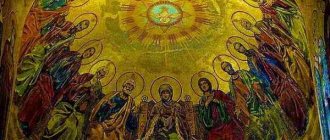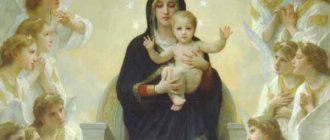The Blessed Virgin Mary paid a visit to her distant relative, the righteous Elisabeth, who was already in her old age. Both women were pregnant. The joy of the Divine presence filled the baby in the womb of Elizabeth and was transmitted to his mother. She met the Mother of God with prophetic words of blessing of the Son of God.
In response, the Queen of Heaven uttered a solemn hymn to the glory of the Lord. Her speech of gratitude was recorded and later turned into the prayer "Most Honest Cherub."
History of the prayer service
Many Orthodox believe that the words of this wonderful prayer were suggested to its author by the Mother of God herself. Indeed, the history of the writing of the holy text is simply extraordinary.
The prayer service was written in the 8th century by the Monk Cosmas of Mayum. On Good Friday, he was visited by divine insight, as a result of which the saint composed this prayer. According to legend, the Mother of God herself appeared after this to Cosmas, expressing her approval and praising him.
The Mother of God personifies purity and innocence
A wonderful addition was received by a song dedicated to the Queen of Heaven in the 10th century in the monastery of St. Athos. One of the monks was praying earnestly in his cell. When he began to say the words of the prayer “Most Honest Cherub,” a very handsome young man suddenly appeared in his cell. He stopped the monk and chanted another, unknown beginning of the prayer service. And only then he added the ending “Most Honest Cherub” to these words. The hitherto unknown words were so beautiful and amazing that the Athonite monk began to ask the unknown young man to write him the beginning of the cherished prayer. But there were no writing materials in the cell. Then the guest asked to bring a stone slab and wrote the words he sang on the slab with his hand. Then he said: “From now on, you and all Orthodox Christians always sing like this,” and he became invisible. After this, the amazed monk realized that it was an Angel of God.
This is how this amazing song arose in honor of the Mother of God, in which human creation is intertwined with angelic creation. From now on, from 980, the sacred text is read in full.
What kind of prayer is this
To understand what the prayer “The Most Honest Cherub” is, it is worth turning to the biblical texts. The Gospels describe an incident when the Virgin Mary came to visit her distant relative, Elizabeth. Both women were pregnant, and the baby, who was in Elizabeth's belly, felt God's presence and began to greet the Lord's Son.
The joy of the baby in the womb was transmitted to his mother, and she began to greet the guest with prophetic words. In response, the Virgin Mary uttered a solemn hymn praising the Creator, the words of this hymn were subsequently written down and became a famous prayer.
Orthodox Christians believe that the words of this prayer were suggested to the author of the text by the Most Pure Virgin Mary herself, and today, when the words of the prayer service are heard in the church, she is invisibly present among the parishioners and blesses them. Indeed, the history of writing the text of the prayer is quite unusual.
The words of this prayer service were written by the Monk Cosmas of Mayum back in the 8th century, and it happened as follows. On one of the Good Fridays, the saint was visited by Divine illumination, as a result of which the text of the prayer to the glory of the Mother of God was written down. There is a legend according to which, after writing the text, the Virgin Mary appeared to the monk and praised him for it and expressed her gratitude.
This song in honor of the Mother of God was supplemented in the monastery located on Mount Athos. One of the monks was praying fervently in his cell, and at that time a young man of extraordinary beauty appeared next to him. This happened precisely at the moment when the monk said the words of the prayer “The most honorable cherub.”
He stopped the monk’s prayer and in a pleasant voice sang a completely different, unfamiliar beginning of this prayer. The monk found this option so beautiful that he began to beg the young man to write down the words so as not to forget later. However, there were no writing materials in the cell. The wonderful guest brought a stone slab and inscribed on it the text that he had sung before. He also left a command to all Christians from now on to sing this text instead of the old one. At that moment, the monk realized that none other than the angel of God had appeared to him.
Thus, from the interweaving of human and Divine texts, a wonderful song arose in honor of the Queen of Heaven, which today sounds in all Orthodox churches.
How does prayer help?
At all times, the Queen of Heaven is the patroness of the human race before the Lord. Believers look to her to satisfy their sorrows and increase their joy.
Christians usually make requests to the Mother of God and say the words of the cherished prayer when the following situations arise in life:
- self-doubt, confusion and loss of moral values. It is not always possible to cope with uncertainty on your own. This is where sincere prayer comes to the rescue;
- inability to find answers to pressing questions on your own;
- envy, greed and selfish intentions of other people cause considerable harm;
- inability to independently get out of a difficult life situation.
The Mother of God grants fortitude to all who ask, delivers them from sinful thoughts and evil intentions, and directs them to the true path. A person who has lost peace can turn to heaven for help in any disaster - not all difficulties can be dealt with on their own.
The Mother of God grants fortitude to all who ask
How to read a prayer in a temple
During its execution, the priest conducts incense on the altar and the entire temple. People love this prayer very much. Many say that during her singing, the Mother of God herself walks through the temple and blesses those who pray with zeal.
While in the temple, you can see people crossing themselves and bowing at random. Before making penitential bows, believers should learn all the rules of conduct in church. So, after pronouncing this prayer text it stands:
- make a bow from the waist;
- and then sign yourself with the sign of the cross.
In most churches it is sung by two people or together with the people. Original language: Greek. It is also available in Church Slavonic and Russian transcription.
How and when to read a prayer appeal
Despite the fact that the prayer service is known to almost all Orthodox believers, there are no clear and firm instructions in the Gospel regarding the place and time of its holding. However, many clergy adhere to some rules and traditions of reading the speeches of the Virgin Mary. Nowadays they are considered generally accepted:
- According to the traditions of Orthodoxy, the prayer of the Mother of God “Most Honest Cherub” is usually sung at Matins between the eighth and ninth canons;
- during the ritual of incense, the deacon walks around the temple, starting from the holy throne and altar and ending with the royal gates;
- in the church, the deacon must stand on the right side of the iconostasis, near the icon on which the divine face of the Heavenly Queen is depicted;
- after the clergyman takes this place, the choir begins to sing;
- You can read the prayer both in church and at home;
- The reading of the prayer service must be chanted.
While saying this prayer, the believer should not be distracted by extraneous things.
The Prayer of the Virgin Mary is sung at Matins
At the end of the service you need to bow to the image
Candles are lit during chanting
"My soul magnifies the Lord..."
The hymn of praise sung by the Most Holy Theotokos to God in one of the Gospel events is at the same time a song of praise to the Mother of God Herself. This widely known song, especially beloved by the church people, is heard at the morning of Orthodox worship and is preceded by the words: “Let us exalt the Mother of God and the Mother of Light in song!” Mother of Light - as the one who gave birth to the “Light of men” (see: John 1, 4).
Song of the Virgin Mary (see: Luke 1, 46–55)
1. My soul magnifies the Lord, and my spirit rejoices in God my Savior. Chorus: Most honorable Cherub and most glorious without comparison Seraphim, who gave birth to God the Word without corruption, we magnify Thee as the real Mother of God.
2. Because you have looked upon the humility of Your servant, behold, from now on all your kindred will please Me. The most honest...
3. For the Mighty One has done greatness to Me, and holy is His name, and His mercy throughout the generations of those who fear Him. The most honest...
4. Create power with Your arm, scatter the proud thoughts of their hearts. The most honest...
5. Cast down the mighty from the throne, and lift up the humble, fill the hungry with good things, and let go of the rich. The most honest...
6. They will remember His servant Israel, remembering His mercies, as He said to our fathers, Abraham and his seed, even unto the ages.
The most honest...
Holy Scripture and Worship
“Try to ensure that the Gospel is assimilated into your mind and heart... Then your activity will conveniently become evangelical . St. Ignatiy Brianchaninov
The source of Orthodox doctrine is Divine Revelation. The Word of God teaches us an image of both right faith and Christian piety. According to the Fathers, every work we do must have the testimony of Scripture. To do this, it must be a constant subject of our attention. Those who neglect this are robbing themselves. “All of us who neglect reading the Scriptures suffer harm and impoverishment from this. In fact, how will we bring our affairs into order if we do not know the very laws by which we need to bring them into order? - asks St. John Chrysostom. A Christian must read, study, and assimilate the Holy Scripture. Scripture, to make efforts to ensure that it - especially the New Testament - becomes the criterion and guide of his entire life.
Orthodox worship, rich in both Old Testament and New Testament biblical texts, is of great help in this. It is worthy of attention that during the divine service the Church teaches us the Holy Spirit. Scripture in the context of its Holy. Tradition, without which Scripture can neither be understood nor assimilated. “Orthodox worship is the Holy Gospel and Sacred Tradition, translated into prayers, miraculous and life-giving stichera, troparia, kontakia, canons, verses, songs, sighs...” writes St. Justin Popovich. These liturgical treasures are the heritage of the Church, which she shares with us.
The song we are talking about today is also from this treasury. Its text is the own words of the Most Holy Theotokos, the chorus is the creation of St. hymn writer Cosmas Maiumsky. The event in which the Virgin Mary sang the song is described in the Gospel of Luke.
From the Gospel story (Luke 1, 39–56)
After the event of the Annunciation (Luke 1, 26-38) - the appearance of the Archangel Gabriel to the Blessed Virgin and Her humble consent to become the Mother of God, Mary hurries to visit her relative Elizabeth, the future mother of John the Baptist. The purpose of the visit is to share His joy with her and to take part in the joy of Elizabeth herself, awaiting the birth of her son. At the moment of the meeting of Mary and Elizabeth, the baby leaped in Elizabeth’s womb, she was filled with the Holy Spirit and uttered prophetic words about the Mother of the Lord who visited her home. According to the fathers, Elizabeth’s words are a joyful greeting from the Earth to the Son of God, who descended from Heaven and was incarnated by the Holy Spirit and the Virgin Mary. Mary answered her with a solemn inspired hymn: “My soul magnifies the Lord, and my spirit rejoices in God my Savior...”, glorifying God for the fulfillment of the promises about the coming of the Savior into the world, and prophetically testified that from now on all generations will please Her for the fact that mercy God's fulfillment of these promises was revealed through Her. Mary's song can be called victorious, since it expresses the triumph of humility and virtue, crowned and exalted by God Himself.
Let us consider the words of this song in more detail in the light of the interpretation of St. fathers of the Orthodox Church.
Patristic interpretation
Let us turn to the blessed one for explanations. Theophylact, Archbishop. Bulgarian, whose interpretations of the texts of the New Testament were called “Blagovestnik” and accepted by the Orthodox Church. “When reading the Evangelists, one should also read the Gospel... Reading the Gospel is necessary, it contributes to the correct understanding of the Gospel and, consequently, to its most accurate fulfillment. Moreover, the rules of the Church require that Scripture be understood as the Holy Fathers explain, and not at all arbitrarily,” writes St. Ignatius Brianchaninov.
So, according to the blessed one. Theophylact...
Verses 1–3. The Virgin, being completely confident in the truth of what was predicted to Her, glorifies God; attributing the miracle not to Himself, but to Him, he says: “He looked at Me, the humble one, and it was not I who looked at Him; He showed Me mercy, and it was not I who sought Him. And “from now on all generations will please Me...” Why please? Is it really for My virtue? No! But because God showed greatness to Me.” Indicates that “His mercy” is not for Her alone, but for all who fear Him. The words “throughout all generations” mean that this mercy will be received from God not only in this age, but also in the eternal (see: Matt. 19:29). Regarding the words “My soul magnifies the Lord... and my spirit rejoices” - Blessed. Theophylact explains that first the soul magnifies the Lord, and only then the spirit rejoices. Do you call yourself a Christian? - Do not diminish the dignity of the name of Christ through unworthy deeds, but magnify it through great deeds, then your spirit will rejoice.
Verses 4–6. According to the explanation of the bl. Theophylact, the muscle of God the Father - Son. The Lord “scattered the arrogant” demons, driving them out of human souls. One can also understand here the Jews, who are still in dispersion. “He brought down the mighty from their thrones,” that is, the demons who dominated people and had thrones in their souls. But the Pharisees, strong as the thieves of the property of the poor and as teachers, have thrones from which they have been deposed. “He exalted the humble” - people or pagans whom sin humbled, exalted, giving them sonship; He filled the hungry pagans (since they did not have the Scriptures, the law or the commandments) with the blessings of the Scriptures, and sent the Jews, rich in the law and commandments, outside the borders of Jerusalem, above and below, deprived of all good. “He received Israel his servant” - it is said either about the sensitive Israelites, many of whom believed, and God’s promise to Abraham was fulfilled: “and in you all the families of the earth will be blessed” (Gen. 12:3); or about spiritual Israel: Israel means “those who see God” - God took all those who see God into the heavenly inheritance.
And let’s complete the interpretation of the Song of the Mother of God with spiritual reflections on this topic. Gregory (Lebedev), bishop. Shlisselburgsky (gave his life for Christ in 1937; canonized in 2005). He writes: “The proud and arrogant collects the treasures of the earth and hopes to satisfy his thirst for primacy on earth... But in vain! The Lord satisfies only “those who hunger for righteousness”... They are satisfied with true “goods” and “become rich in God”... And these are blessed... And the arrogant ones chase after the illusory saturation of life, after deceptive wealth. They are not even rich, but “getting rich,” that is, thinking that they are rich. In reality, they are the last beggars, because, chasing after the illusory foundation of life, they remain in emptiness and themselves empty and naked... The Lord sent those who were rich away “with nothing”...
Thus, the humble, who has surrendered himself to God’s guidance and has taken God’s path of life, is confirmed, exalted, and saturated with life; and all this because the Lord “took” him as “Israel, His servant,” and extended over him “His mercy promised to Abraham and his seed (descendants) forever.”
Exalt the Lord, my soul, and rejoice, my spirit, in God my Savior!”
"The most honorable Cherub..."
The chant that serves as the refrain of the Song of the Virgin Mary is not only beautiful, but also deeply dogmatic, confirming the truth that Orthodox worship is a wonderful textbook of theology. This hymn, which expresses the essence of the Church’s teaching about the Mother of God, contains two important truths for our faith - about the Mother of God and the ever-virginity of the Blessed Virgin Mary. These truths clarify the question of the venerability and unparalleled glorification of the Virgin Mary in the Church, placing Her above all created beings - not only people, but also Angels.
About the veneration of the Mother of God
“Of all that is good, She is the best; of all that is holy, She is the holiest; of all that is pure, She is the purest; of all that is wonderful, She is the most wonderful... After the Lord Christ, She is the most perfect All-Virtue in the human race.” St. Justin Popovich
“Most Holy, Most Pure, Most Blessed” the Church calls the Most Holy Theotokos. We honor Her - because this is the will of God; because She is a wonderful Mother of God and Virgin; because She is the Mother of salvation, because She gave birth to the Savior; because She is All-Holy; because She is the Mother of all Christians; because “thou didst not forsake the world in its dormition”... And the personal experience of all those who turn to Her with requests for help and intercession testifies that these requests do not remain unanswered.
At the same time, St. Filaret of Moscow notes that our veneration should not consist only in words. He writes: “Praise is not red in the mouth of a sinner. If we wish to honorably please the Mother of God, then let us love Her dignity and virtues with all our hearts; having loved, let us be jealous, if possible, to worthily follow in life what we please in thought and word.”
Prepared by Lyudmila Kuznetsova
Text of the prayer “More honorable Cherub”
“My soul magnifies the Lord, and my spirit rejoices in God my Savior. Chorus: Most honorable Cherub and most glorious without comparison Seraphim, who gave birth to God the Word without corruption, the real Mother of God, we magnify You. As you look upon the humility of Your servant, behold, from now on all your kindred will please Me. Chorus: Most honorable Cherub and most glorious without comparison Seraphim, who gave birth to God the Word without corruption, the real Mother of God, we magnify You. For the Mighty One has done greatness to Me, and holy is His name, and His mercy throughout all generations of those who fear Him. Chorus: Most honorable Cherub and most glorious without comparison Seraphim, who gave birth to God the Word without corruption, the real Mother of God, we magnify You. Create power with Your arm, scatter the proud thoughts of their hearts. Chorus: Most honorable Cherub and most glorious without comparison Seraphim, who gave birth to God the Word without corruption, the real Mother of God, we magnify You. Destroy the mighty from their thrones and lift up the humble; Fill those who hunger with good things, and those who are rich let go of their vanity. Chorus: Most honorable Cherub and most glorious without comparison Seraphim, who gave birth to God the Word without corruption, the real Mother of God, we magnify You. Israel will receive His servant, remembering His mercies, as He spoke to our fathers, Abraham and his seed, even unto eternity. Chorus: Most honorable Cherub and most glorious without comparison Seraphim, who gave birth to God the Word without corruption, the real Mother of God, we magnify You.”
Of course, prayer offered to the Mother of God bears fruit only if the person asking is sincere in his thoughts and has no evil in his soul. The clergy themselves consider this ritual to be recognition and respect for the Virgin Mary, and Christians, through this prayer, can express their gratitude to the Mother of the Savior for the protection and help provided to them.
If you find an error, please select a piece of text and press Ctrl+Enter.
The essence of prayer
The text of the prayer glorifies the Mother of God, since She is the mother of our Lord Jesus Christ, and thanks to her purity and godly lifestyle, she stands even above all the Angels and Archangels.
Also read:
- The world of angels in Orthodoxy
- Who are the archangels
- Icon of the Holy Archangel Gabriel
In her words, the Most Pure Virgin thanked the Creator for his mercy towards Her and all humanity. Now, in the words of a song of praise, humanity thanks both the Lord and the Mother of God for protection and mercy.
Important! The text of the appeal is especially dear to believers, since thanks to it, every Christian can glorify the Creator with the words with which the Mother of God herself once sang His glory.
The name of the prayer “The Most Honest” comes from the fact that a chorus was added to the song of praise to the Most Pure Virgin, beginning with the words “The Most Honest Cherub.” Catholics call this prayer the Magnificant, after the first word of the Latin text.
When should you pray to the Virgin Mary?
The Mother of God is the intercessor of all people on earth. She is in heaven next to God and constantly listens to the prayers of the laity and asks the Almighty to help people. On days of joy and success, the Virgin Mary should be thanked for her support and care.
You should seek help and read “The Most Honest Cherub” in situations:
- when a believer feels that sinful thoughts are arising in his soul, which he cannot cope with on his own;
- when the soul is wounded by malice and greed by ill-wishers and enemies (we also offer separate prayers from enemies);
- when searching for an answer to a difficult question that troubles the soul.
In similar situations, it is important for an Orthodox Christian to receive advice, a hint from above on how to act correctly and spiritual support.









